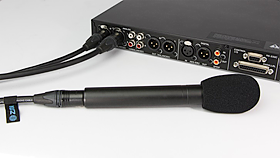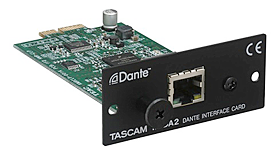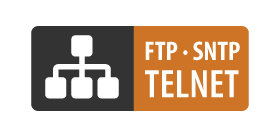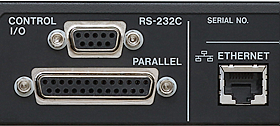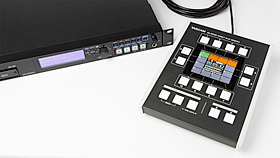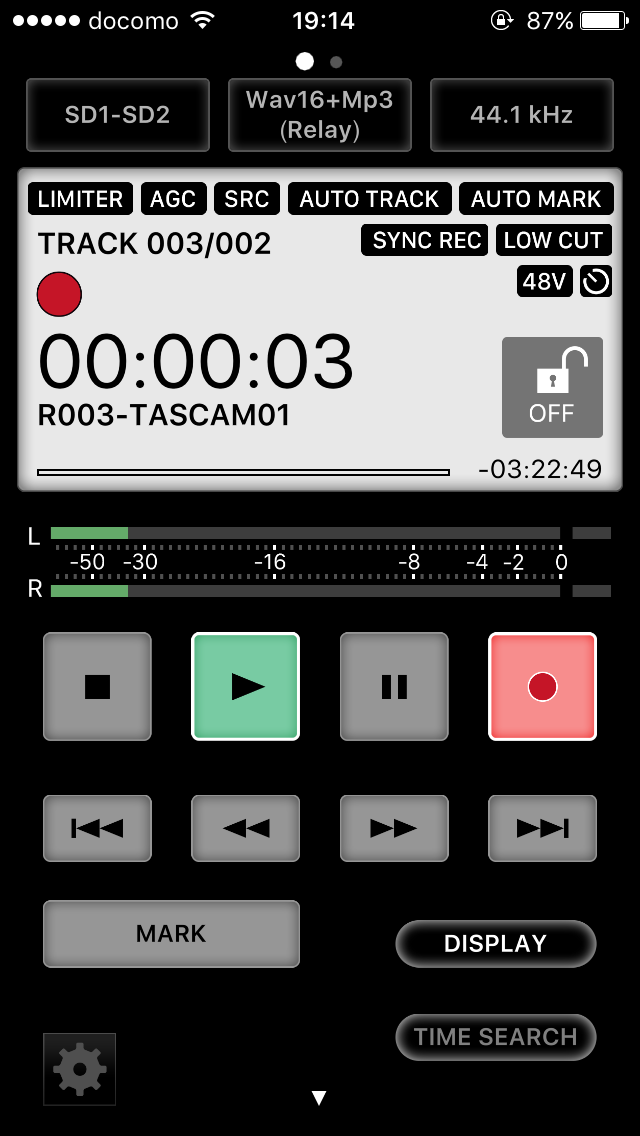Tascam SS-CDR250N
The SS-CDR250N is a networkable solid-state/CD recorder/player with a variety of remote control options for professional applications like in broadcast studios or fixed installations. It records in WAV and MP3 format to SD/SDHC/SDXC and USB flash memory or in MP3 and audio CD formats to CD via a slot-loading drive. Since the recorder is able to connect to an FTP server via a network, it can upload recordings automatically after a recording has been finished or download files for playback. Time synchronisation via SNTP is also possible.
With its dual SD card slots, the SS-CDR250N offers more security to your valuable files compared to conventional recorders. During recording, backups can be created on the second memory card, or the recorder switches to the second card as soon as the first card runs out of memory. The unit also closes files automatically in case there is a sudden power outage during recording to avoid loss of the entire recording session.
The SS-CDR250N can be controlled in a variety of ways: The RC-SS150 remote control offers a convenient interface with a colour LC display and 12 keys for flash playback. There is also a dedicated app available for iOS and Android devices that can control transport operations and various settings. Or you can integrate the recorder into existing environments using serial or parallel control.
For audio connections, the SS-CDR250N is equipped with balanced and unbalanced analogue inputs and outputs as well as SPDIF coaxial and AES/EBU digital I/O with sample rate converter. An optional Dante interface card offers two-channel input/output for Dante audio networks.
Backup and relay recording using two SD cards and a USB medium
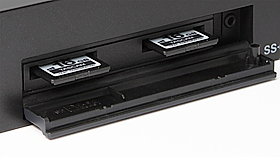
When recording, the SS-CDR250N can use two SD cards and a USB flash drive to create backups or use multiple media in succession. A folder with the same file path as the current media will be created on the secondary media and used for backup and relay recording.
Backup recording can prevent you from unpleasant surprise
When using the BACKUP option while recording, the unit stores audio files on both selected media in parallel. Such backups can help you avoid trouble in case of problems with a recording medium. You can select from the menu which of the remaining media is used for the backup.
Relay function for long recording times
When using the RELAY option while recording, the unit uses multiple media in succession to allow continuous recording for long periods of time. You can even combine a dual-format recording (record in WAV and MP3 format simultaneously) with the relay function.
Automatic file closing
To further help you secure your valuable recordings, the unit automatically saves and closes recording files every few seconds to safeguard against data loss in case of a power outage.
Professional and consumer audio inputs and outputs
XLR, RCA, AES/EBU, SPDIF – what else would you need?
The SS-CDR250N offers a variety of audio inputs and outputs to integrate into virtually any environment. You can choose from analogue XLR or RCA inputs and outputs or use AES/EBU (XLR) or SPDIF (Coaxial) to connect to digital equipment. You can also enable 48-volt phantom power in the menu to use the XLR inputs with condenser microphones.
If you have a Dante network …
By installing a Tascam IF-DA2 Dante network card (available as an option), the SS-CDR250N/SS-R250N can easily be integrated into your Dante network. This card fits to an extension slot on the rear side and offers two channels of audio in both directions (in and out) at up to 96 kHz / 24 bits.
Remote control by LAN, parallel port, RS-232C or Android/iOS app
Ethernet connection for remote control by Telnet and file transfer by FTP
By connecting the recorder to an Ethernet network, you can remotely control it by Telnet. Access is possible from any kind of system, including Windows, Mac and Unix. A network connection is also required to make use of the built-in FTP functions to upload recorded files to a specified server or download files for playback. Since the unit also acts as an FTP server, files on the unit can also be accessed from a computer.
SNTP time synchronization
With SNTP support, the SS-CDR250N/SS-R250N can automatically update its internal clock at regular intervals over a network, so that timer events can be executed accurately.
External parallel/serial control
In addition to remote control and monitoring using the LAN function, external remote control using parallel and RS-232C serial protocol is supported. This allows the unit to be integrated into media systems and other environments.
RC-SS150 Dedicated wired remote control
The dedicated RC-SS150 remote control unit is also connected and power-supplied via the unit's RS-232C port. It has 12 flash start buttons arranged around a clearly readable TFT display and gives you access to playlists with up to 96 tracks. You can also change playback area and playback mode or settings like Repeat, Auto Cue, Auto Ready and Incremental playback.
Dedicated control app for Android and iOS
With SS250 Control, Tascam offers a freely available dedicated control app that enables you to remotely control the recorder’s transport functions, access menu settings and monitor levels in realtime from your Android or iOS tablet or smartphone. You can also use the app to lock the buttons on the unit’s front to prevent operation from the unit itself when it is located in a public place, for instance. And the app shows icons to inform you when files are being uploaded or downloaded by FTP.
Features at a glance
General features
- Records to and plays from USB flash memory (up to 64 GB), SD/SDHC/SDXC cards (up to 128 GB), CD-R/CD-RW
- Supports recording and playback of high-resolution files up to 96 kHz / 24 bit
Network/control capabilities
- FTP client function enables automatic uploading of recorded files or downloading audio files from the server
- With event lists for recording, playback, download and other functions, the unit can be operated automatically based on the time set
- Time synchronisation via SNTP client enables event management with high accuracy
- iOS/Android control app allows transport operations and remote control of various settings
- Optional IF-DA2 interface card supports Dante two-channel input and output
- Serial and parallel ports
- RC-SS150 flash start controller with a colour LCD screen available as an option
- Tascam RC-3F footswitch or RC-20 remote control can be connected
Recording capabilities
- Dual SD memory card slots permit backup and relay recording
- Marks can be set automatically when an error occurs or the input overloads
- The pre-recording function prevents any missing part at the beginning of your recordings
- Auto track function automatically trims audio material to tracks
- Compressor and limiter can help to improve the recording quality
- Auto level control available to automatically adjust the input level for recording
- Recording can be started as soon as the unit is turned on (Power-on recording function)
- Direct recording enables a recording to start without switching to record ready first
- XLR input connectors for microphones with phantom power supply (can also be used with line sources)
- RCA input connectors for consumer-level sources
- AES/EBU digital input (XLR)
- SPDIF coaxial input (RCA)
Playback functions
- Call function that saves the position where your last playback starts
- Ducking function automatically reduces the playback level while the input level rises and vice versa
- Incremental play (skip to each next track by pressing the PLAY button)
- Auto Cue locates the first sound in a track when in playback standby
- Auto Ready allows playback standby before the next track begins
- Pitch control and key control function for speed and key adjustments
- Playback modes such as Program, Random, and Single
- Repeat function (all tracks, A–B section)
- Monaural mix playback function
- Marks can be set at any position
- EOM (End of message) can notify the user before the track ends
Other features
- Sampling rate converter for inputs and outputs
- Link playback function allows two units to be operated in parallel
- Automatic file closing to avoid data loss if there is a sudden power loss during recording
- User presets: Up to three sets of settings can be stored to quickly switch input and output, sampling rate and other functions
- 1U rack-mount size
New features with firmware v1.30
- RS-232C and Telnet commands can now also be used to power on and off the main unit and change setting of the TIME SKIP feature (see RS-232C/Telnet protocol specifications v1.11 for details)
- SS250 Control v2.0.0 (remote control app) is required for this firmware
New feature with firmware v1.20
- Files and folders can be renamed and edited using RS-232C and Telnet
New features with firmware v1.10
- Automatic track division is now possible in time increments (1–10 minutes, 15/30 minutes, 1 hour, 2/6/8/12/24 hours)
- SS250 Control v1.1.0 (remote control app) is required for this firmware
New features with firmware v1.01
- SS250 Control (remote control app) is now supported
- RC-900 remote control is now supported
Specifications
| General | ||
|---|---|---|
| Recording media | SD cards (512 MB – 2 GB) SDHC cards (4–32 GB) SDXC cards (64–128 GB) USB flash drives (512 MB – 64 GB) CD-R/CD-RW |
|
| Recording and playback file formats | MP3: 44.1/48 kHz, 64/128/192/256/320 Kbit/s WAV: 44.1/48/96 kHz, 16/24 bits CD-DA |
|
| Number of channels | 2 channels (stereo) 1 channel (mono) |
|
| Analogue audio inputs and outputs | ||
|---|---|---|
| Analogue input (unbalanced) | RCA pin jacks | |
| Rated input level | –10 dBV (0.316 Vrms) | |
| Maximum input level | +6 dBV (2.0 Vrms) | |
| Input impedance | 10 kΩ or higher | |
| Analogue input (balanced) | XLR-3-31 (1: GND, 2: HOT, 3: COLD) | |
| When used as line input | ||
| Nominal input level | +4 dBu (1.23 Vrms, when Ref.Level set to other than −9 dBFS) +6 dBu (1.55 Vrms, when Ref. Level set to −9 dBFS) |
|
| Maximum input level (switchable) | +15 dBu (4.36 Vrms, Ref. Level: −9 dBFS) +18 dBu (6.16 Vrms, Ref. Level: −14 dBFS) +20 dBu (7.75 Vrms, Ref. Level: −16 dBFS) +22 dBu (9.76 Vrms, Ref. Level: −18 dBFS) +24 dBu (12.28 Vrms, Ref. Level: −20 dBFS) |
|
| Input impedance | 10 kΩ or higher | |
| When used as mic input (phantom power supported) | ||
| Maximum input level | +4 dBu (1.23 Vrms) | |
| Minimum input level | –70 dBu (245 μVrms) or higher | |
| Input impedance | 2.2 kΩ or higher | |
| Analogue output (unbalanced) | RCA pin jacks | |
| Rated output level | –10 dBV (0.316 Vrms) | |
| Maximum output level | +6 dBV (2.0 Vrms) | |
| Output impedance | 200 Ω | |
| Analogue output (balanced) | XLR-3-32 (1: GND, 2: HOT, 3: COLD) | |
| Nominal output level | +4 dBu (1.23 Vrms, when Ref.Level set to other than −9 dBFS) +6 dBu (1.55 Vrms, when Ref. Level set to −9 dBFS) |
|
| Maximum output level (switchable) | +15 dBu (4.36 Vrms, Ref.Level: −9 dBFS) +18 dBu (6.16 Vrms, Ref.Level: −14 dBFS) +20 dBu (7.75 Vrms, Ref.Level: −16 dBFS) +22 dBu (9.76 Vrms, Ref. Level: −18 dBFS) +24 dBu (12.28 Vrms, Ref.Level: −20 dBFS) |
|
| Output impedance | 200 Ω | |
| Phones output | 6.3-mm standard stereo jack | |
| Maximum output power | 45 mW + 45 mW or higher (THD+N 0.1% or less, into 32 Ω load) | |
| Digital audio inputs and outputs | ||
|---|---|---|
| Digital input (AES/EBU) | XLR-3-31 | |
| Input impedance | 110 Ω | |
| Format | AES3-2003 / IEC60958-4 (AES/EBU) | |
| Supported sampling frequencies | 44.1 kHz, 48 kHz, 96 kHz When SRC ON, 32–192 kHz can be received |
|
| Digital input (SPDIF) | RCA pin jack | |
| Format | IEC60958-3 | |
| Supported sampling frequencies | 44.1 kHz, 48 kHz, 96 kHz When SRC ON, 32–192 kHz can be received |
|
| Digital output (AES/EBU) | XLR-3-32 | |
| Output impedance | 110 Ω | |
| Format | AES3-2003 / IEC60958-4 (AES/EBU) | |
| Supported sampling frequencies | 44.1 kHz, 48 kHz, 96 kHz | |
| Digital output (SPDIF) | RCA pin jack | |
| Format | IEC60958-3 (SPDIF) | |
| Other inputs and outputs | ||
|---|---|---|
| Remote jack | 2.5-mm TRS jack (for Tascam RC-3F or RC-20, sold separately) | |
| USB port | 4-pin USB, A-type | |
| Protocol | USB 2.0 High Speed (480 Mbit/s) | |
| Serial port (RS-232C) | D-sub 9-pin | |
| Parallel port | D-sub 25-pin | |
| Maximum input voltage | +5.5 V | |
| High-level minimum input voltage | +2.31 V | |
| Low-level maximum input voltage | +0.99 V | |
| Output format | Open collector (10 Ω output impedance, 20 V withstand voltage, 35 mA maximum) | |
| Low-level maximum output voltage | 0.5 V | |
| 5 V power supply maximum supplied current | 100 mA | |
| Network connector (Ethernet) | RJ45 | |
| Compatible standard | 100BASE-TX | |
| Audio performance | ||
|---|---|---|
| Frequency response (LINE IN or MIC IN to LINE OUT) | 20 Hz – 20 kHz, ±0.5 dB (Fs = 44.1/48 kHz, JEITA) 20 Hz – 40 kHz, +0.5/-3 dB (Fs = 96 kHz, JEITA) |
|
| Distortion | 0.002 % or less (LINE IN to LINE OUT, Ref. Level: −16 dBFS, Fs = 44.1/48/96 kHz, JEITA) | |
| S/N ratio | 106 dB or more (LINE IN to LINE OUT, Fs = 44.1/48/96 kHz, JEITA) | |
| Dynamic range | 106 dB or more (LINE IN to LINE OUT, Fs = 44.1/48/96 kHz, JEITA) | |
| Crosstalk | 100 dB or more (LINE IN to LINE OUT, Fs = 44.1/48/96 kHz, JEITA) | |
| Equivalent input noise (EIN) | −125 dBu or less (150 Ω, 20 kHz LPF, A-weighted) | |
| Power supply and other specifications | ||
|---|---|---|
| Mains power | AC 100–240 V, 50-60 Hz | |
| Power consumption | 20 W | |
| Dimensions (W × H × D) | 483 mm × 45 mm × 301 mm | |
| Weight | 3.2 kg | |
| Permissible operating temperature range | 5–35 °C | |
Design and specifications subject to change without notice.
| Title | Type | Size | Download |
|---|---|---|---|
| SS-CDR250N_Manual_vB.pdf | 3.20MB | Download |
Customers who bought this product also bought



